Below are the ten—okay fine, eleven—most satisfying and memorable films I saw in 2021:
 11. Nomadland A-
11. Nomadland A-
Let's call this one an "honorable mention." A good half of the films on this year's list consists of ones that are technically 2020 movies, but they were not made available for me to see until this year—including
Nomadland, which absolutely would have been on my top ten in 2020 had I been able to watch it then. It won Best Picture, for Christ's sake! Best Actress too, for Frances McDormand. The trouble is, I so want to include these other ten movies on my top ten for 2021 that I am forced to relegate this one to . . . let's call it "#11." Sure, I'm cheating. You'll live. This beautifully meditative movie about a woman living out of her van in retirement, taking seasonal jobs to support herself, and shot with non-actors who actually live the life being depicted, is a beautifully unique cinematic experience. Its quietness and casual observations of American landscapes left me unsure of its rewatch potential, and then when I saw it again with Shobhit when he got his screener for the SAG Awards, I enjoyed it every bit as much.
What I said then:
There’s a hint of sweetness to the overall arc of Nomadland, as Zhao finds to need to find any of the nomads to be sinister or predatory. Instead, she finds a very cooperative society of travelers, each of them with their own story, none of them boring. The fact that almost all of them appear just as themselves means that there is no element of “Hollywood glamor” in any of these depictions, and McDormand fits right in among them.
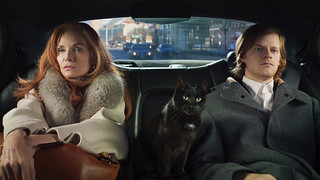 10. French Exit B+
10. French Exit B+
I gave out eight solid As and ten A-minuses this year, so why am I including a B-plus movie on this list? The reason is simple: I have shifted my definitions for these annual lists to
most satisfying and memorable, which is not synonymous with "best." I can fully acknowledge that a movie featuring a cat who turns out to be containing the soul of a dead husband, and who can converse with live humans via seance as though on the telephone, kind of degrades the objective quality of a film. The thing is, those very elements are still a big part of what made me love this movie, which I wish with all my heart would become a cult classic, as it would have had that potential decades ago. Today, it passed by all but ignored, but I have already watched it twice, and can easily imagine watching it many more times as the years go on. Michelle Pfeiffer hasn't been so quintessentially perfect for a part, here as an eccentric and sardonic rich single mother of a barely-grown man (Lucas Hedges) who has just lost all of her money, since she played Catwoman in 1992. This movie may not be high art, but it is compulsively rewatchable.
What I said then:
Still, it all comes back to Michelle Pfeiffer. Performances like this are what the word “iconic” was made for. That word is so overused it has lost all meaning, but Pfeiffer brings it full circle. I haven’t loved her so much in a movie since she played Catwoman nearly—let me check my notes—thirty years ago. This woman is a national treasure, she commands attention, and so does this charmingly peculiar movie.
 9. Mass A-
9. Mass A-
The vast majority of this film is just four people, played by Martha Plimpton, Jason Isaacs, Ann Dowd and Reed Birney. They play two upper-middle-aged couples, parents of students involved in a local school shooting six years prior; one couple is the parents of the culprit, the other couple parents of one of the many victims. They have agreed to meet and basically process their shared trauma over the event, maybe put out feelers for the possibility of forgiveness and some kind of redemption—not among the teenagers (dead in either case), but among themselves in regards to how things went down in the immediate aftermath of the tragedy. The film unfolds mostly with just these four alone in a room, and is very like a stage play, except one that works incredibly well for the screen (it's actually an original script, by director Fran Kranz). Admittedly not the most uplifting stuff, but it's laden with meaning and purpose, and I found it captivating.
What I said then:
Kranz’s writing is also exquisite. By definition with a presentation like this, there has to be a great deal of exposition—the whole movie is nothing but dialogue. It never feels like exposition, though, and a vast array of details are revealed to the story of how they all got here, just through the organic unfolding of their gut wrenching, yet riveting conversations
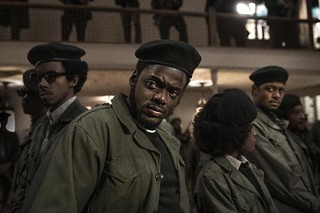 8. Judas and the Black Messiah A
8. Judas and the Black Messiah A
After writing a genuinely rave review of
Judas and the Black Messiah, I later encountered criticism that its women characters, particularly writer and Black Panther activist Deborah Johnson (Dominique Fishback), are underserved, which is fair. I was so enamored with the performances of Daniel Kaluuya and LaKeith Stanfield, as Black Panther Party Chicago Chapter Chairman Fred Hampton and deceiving FBI informant Bill O'Neal, respectively, that in my initial review I failed to even mention any of the women characters, some of whom played key parts, albeit a bit underplayed in the movie. The film is so successful on every other level, however, that I can't bring myself to discount it. Every aspect of this film, from the acing to the direction to its technical finesse, is top notch—a heavy story that is eminently compelling.
What I said then:
It’s a rare thing when you can tell a film is of superior quality from the first frame, and Judas and the Black Messiah is one such example. I was unaware of director Shaka King before this, but you can bet I’ll be remembering that name, seeking out his other work, and looking forward to what he does in the future. That this is only his second feature film is a stunning accomplishment.
 7. The Power of the Dog A
7. The Power of the Dog A
Here we finally get another movie about deeply repressed gay cowboys, only this one, while still a bit downbeat, is less tragic and more beautifully shot than
Brokeback Mountain. Funny that that earlier film (from 2005) spawned years of joke references to its title, and
The Powero the Dog managed the unlikely feat of inspiring a surprising number of
"Bronco Henry" memes. Anyway, this is a quiet, incredibly slow yet immensely powerful story of an emotionally abusive cowboy (played by Benedict Cumberbatch) who won't stop talking about his late mentor, and eventually takes a shine to his brother's new wife's just-grown son in a way that may or may not be romantic. There's no sex, no violence, although often the threat of it—the film is brimming with a tension that is precisely what makes it great. It's also gorgeously shot, the landscape standing in for 1920s Montana actually being New Zealand notwithstanding. This is easily Jane Campion's best film in nearly thirty years.
What I said then:
The Power of the Dog is a bit of a narrative puzzle, and over the course of its second half they fall into place, linking inextricably into each other, with deep satisfaction. This is a superbly constructed film.
 6. C'mon C'mon A
6. C'mon C'mon A
I finished watching
C'mon C'mon and immediately wanted to tell all my friends who are parents to watch it. Writer-director Mike Mills (
Beginners,
20th Century Women) has a knack for presenting a unique point of view that sucks you right in, by turns telling stories inspired by elements of his own life: the late coming out of an elderly father; the relationship with a carefree mother; and now with
C'mon C'mon, the existential challenges of having parenthood thrust upon you. Joaquin Phoenix plays a single, childless man who suddenly looks after his ten-year-old nephew (Woody Norman, who is wonderful) when his sister (Gaby Hoffman) must tend to the mental health of her estranged, bipolar husband (Scoot McNairy). Thus this is about a middle-aged, deeply empathetic man getting a crash course in caring for a child. It sounds simple, but this film is anything but. I was deeply moved by it, to such an extent that I could barely fathom how much more I would have been affected if I actually had children of my own.
What I said then:
Ultimately, you night say, it’s about emotional vulnerability, within the context of the hopes and dreams we have for the very children that drive us crazy. This movie is very honest about parenting, and about what it’s like to deal with children, in a way that few movies really are. Jesse doesn’t exist to amuse, or be precocious, or serve as a plot catalyst in the way children typically are in film. He just is, and he exists as a wholly dimensional human being.
 5. Collective A
5. Collective A
The best documentary I saw all year, this film technically from 2020 is an astonishing look at the objective mess that was (and perhaps still is?) the health care system in Romania. One of the most shocking and dramatic documentaries I have ever seen, this makes a unique case for retaining the integrity of investigative journalism. This movie has to be seen to be believed, the kind of high-level government corruption usually reserved for fiction. Just when you think they couldn't possibly be any worse, over and over, they prove you wrong.
What I said then:
My jaw kept dropping as I watched this movie, over and over, lower than the last time. It’s not just the examples themselves but the sheer scale of the corruption and lethal negligence in Romanian hospitals.
 4. Quo Vadis, Aida? A
4. Quo Vadis, Aida? A
Call this movie "homework" if you want. This tragic tale of a mother desperately trying to get her family out of Bosnia during the Srebrenica Genocide at the hands of Serbians should be required viewing. The Jewish holocaust was not the only genocide we should always be aware of, nor is it anywhere close to the most recent—this one occurred in 1995. I was 19 years old. This shit occurs all over the world at regular intervals, and they should not be ignored. There are Serbs to this day who refuse to call it a genocide, even though it's clearly what this was. Writer-director Jasmila Zbanic takes it down to a human level, narrowing the focus on one woman (Jasna Djuricic), a translator for increasingly ineffective Dutch army protectors, almost certainly spared early annihilation herself by virtue of her useful job. In the meantime, she takes increasingly desperate efforts to get her husband and two barely-grown sons out of the country to someplace safe, virtually the entire movie following along with these efforts. What sets
Quo Vadis, Aida? ("Where are you going, Aida?") truly apart is Jasmila Zbanic's refusal to give this story a neatly tied up, comforting ending. This isn't the typical story of hope in the face of adversity that storytellers love to tell; it's a defiant reflection of the fate of the majority in scenarios like this. Rare is the film of such high integrity.
What I said then:
In other words, it’s not a good time. Instead, this is a film that serves as a challenge to remember, and to acknowledge the extent of conflict around the globe. I thought a lot about the 1993 Steven Spielberg film Schindler’s List
while watching this—there are many similarities. A key difference is that Quo Vadis, Aida?
does not in any way present itself as “art.” There is no black and white cinematography here, no symbolic child in a red coat. This is straightforward drama, and a gripping one at that.
 3. Minari A
3. Minari A
Trigger warning for the far rightwing dipshits:
Minari is the lovely and simple tale of Korean immigrants in 1980s rural Arkansas, and it doesn't get more American than this. This is another technically 2020 film that I could not see until this year, garnering a much-deserved six Oscar nominations, including a win for Best Supporting Actress (Yuh-Jung Youn, playing the delightful grandmother). It's a refreshing departure from the countless films about people of color in America that tend to turn their focus to racism; this film doesn't pretend racism doesn't exist, but tells a story that turns out to have little to do with it. That's the trick of
Minari, really, how it tells the story of an immigrant family, an experience universal to the ancestors of everyone in this country who is not Indigenous, and reminds us of both the value of our differences and the pertinent things we have in common.
What I said then: Minari
is a minor miracle of a movie, something unlike anything else you have ever watched, and yet no less an American story than any other American film. It’s a incredibly specific story that focuses on one family of Korean immigrants attempting to start a farm in Arkansas, and still a reflection of the very story of countless setters who were an integral part of what made this country what it is. It’s a story of struggle and rebirth, of hope borne of adversity, an example of the American dream that shows it’s not as simple as this country wants to tell itself.
 2. Passing A
2. Passing A
In sharp contrast to
Minari,
Passing is quite overtly, even provocatively, about race—so literal, in fact, that it is shot in black and white. Based on a 1929 novel by Nella Larsen, it takes a peculiar point of view on the idea of "passing," in this case a light skinned Black woman (Ruth Negga) successfully living as a white woman in New York City. Instead of telling the story from that woman's perspective, we see it unfold through the eyes of her childhood friend (Tessa Thompson), who becomes fixated on her friend and how she has managed to pull this off—going so far as to marry and have a child with an apparently imperceptive—and predictably racist—white man (Alexander Skarsgård). This movie forces us to confront largely unexamined questions about how we approach race, which is a concept that has no basis in actual biology or genetics, revealing the fallacy of the constructs we build around ourselves. This is a starkly shot film dense with meaning and built on measured, intentional performances, and will not be soon forgotten.
What I said then:
Irene is the protagonist, a woman who, in the subtly attention-grabbing opening scene, finds herself “passing” almost by accident while shopping in higher-end stores of New York, tilting her large hat to obscure her face just enough. From the start, the dialogue is highly stylized, meticulously crafted, exquisitely written. Combine that with incredible performances nearly across the board and stunning black and white cinematography by Eduard Grau (A Single Man
), and Passing is practically impossible for any cinephile, anyone with an appreciation for film as art, to resist.
 1. Spencer A
1. Spencer A
I doubt this movie will top anyone else's top ten movies of 2021, but to me that's perfectly fitting, given that it feels like Pablo Larraín simply made a movie tailor made for Matthew. This is the guy who directed the similarly excellent
Jackie, which
would have been my #1 movie of 2016, if not for the existence of surprise Best Picture winner
Moonlight. Both
Jackie and
Spencer are about royals, of sorts: the former figurative, the closest thing the United States has ever had to it; the other much more literal, focusing on Princess Diana and her holiday visit with the royal in-laws. Although both characters are connected to historic assassinations,
Spencer leaves Diana's ultimate fate to subtext, instead focusing on her inner torment in a loveless marriage. There has been some criticism of this film's somber tone, claims that Diana was far more amiable than depicted here, but I don't care. I can only say that the casting of Kristen Stewart as Diana turns out to be inspired, as her embodiment of Diana as a character is nothing short of astonishing. The rest of the cast is excellent too, but they all revolve around her, enduring a series of mystifying traditions that control her every move, right down to different outfits worn to every separate family meal (the costume design is superb). It's a strange thing to be both an anti-royalist and endlessly fascinated by members of the royal family rendered victims of their own strictures, but this is a movie that fits squarely, perfectly, into that space.
What I said then:
We can find ways to dismiss her struggles within the context of objectively insane amounts of privilege, but Spencer
refuses to let us forget how any existence in that exclusive world can be a genuine prison all its own. Larraín is brilliantly capturing Diana’s desperate feelings of loneliness and emotional isolation. There is a sad poetry to the overall presentation in Spencer, which features such beauty, including on the part of Diana herself, her face, her exquisite outfits, every detail of that beauty just being another link in the fencing of her cage.
Five Worst -- or the worst of those I saw
 5. Dear Evan Hansen C+
5. Dear Evan Hansen C+
If it weren't for how much I enjoyed the music, I would have truly hated this movie. As it is, the music is about its only redeeming quality, the premise being truly bonkers, as an insecure teenager goes along with the assumption that he had been secretly friends with a boy who committed suicie, even though he wasn't, and worms his way into the lives of the dead boy's family in the process. The widely mocked age of the actor (Ben Platt, 27) playing the title character is the least of this film's problems, which revolve around deeply unethical practices without ever truly addressing them as such.
What I said then: Dear Evan Hansen
is the perfect movie for people with no critical thinking skills. ... Watch this movie and then try imagining the exact same story as a non-musical stage play. You'd be ready to slit your own wrists by the end of it.
 4. Reminiscence C+
4. Reminiscence C+
This might be the most "blah" movie I saw all year. I found nothing inherently bad about it, except for its definitive mediocrity. The most memorable thing about it is seeing a near-future Miami skyline largely submerged in sea water. The fact that we never see any of the natural disasters that would contribute to such a mess is the least of its problems; there's also the setting of a famously multicultural city but a principal cast of mostly white people. Blech. Yawn. What the story is about frankly doesn't even matter because you'll be bored and distracted before it becomes relevant. It has some nice special effects, though, so its wild implausibility notwithstanding, it's often quite pretty to look at.
What I said then:
I basically wasted two hours watching Reminiscence in the movie theater. It’s also available streaming on HBO Max, and I wouldn’t even recommend you watch it there. You’ll still wish you could get those two hours back. Well, if you have any taste or sense of quality, anyway.
 3. Titane C
3. Titane C
This French "body horror" movie is weird as shit, and to no discernible purpose. The first half of it follows a woman with a titanium plate in her head who commits a series of gruesome murders, has sex with and gets impregnated
by a car (yes, really), and then the second half details her somehow successfully convincing a grieving man that she is his missing son. Did I mention this movie is all over the place? I suppose there is some novelty in the idea of a woman fucking a car and then giving birth to a titanium-plated baby with motor oil as amniotic fluid, but . . . let's just say I wasn't feeling it.
What I said then:
All I really got out of Titane was an hour and forty-five minutes of thinking, What the fuck? We never see Alexia bleed, although we regularly see her leaking motor oil, out of tears in the skin of her belly revealing more shiny metal underneath, or even leaking out of her nipples. Her body goes through a lot of abuses, much of it self-inflicted in her attempt to make herself look like Vincent’s missing son. I had to turn away from the screen a lot. I was just relieved when I could turn away one last time and leave the building.
 2. Malcom & Marie C
2. Malcom & Marie C
This movie is the epitome of self-serious pretension disguised as high art. I mean, it
is beautifully shot in black and white, but those shots are framing only two insufferable L.A.-based actor characters spending the entire run time arguing about vapid Hollywood bullshit. This was writer-director Sam Levinson's answer to "lockdown movies," where cast and crew were minimal, but I guess he took "write what you know" pretty extremely to heart, reportedly inspired in part by his once forgetting to thank his girlfriend in an award acceptance speech. I mean. Who cares?
What I said then:
What I cannot figure out is who this movie is for. Fans of the actors? People merely interested in seeing how filmmaking can work (or can’t work) in the midst of pandemic-related restrictions? Maybe just rubber-neckers eager to witness a disaster? Why this had to go on for 106 minutes, I’ll never know.
 1. New Order C
1. New Order C
The most unpleasantly nihilistic movie I have seen in recent memory, maybe even in decades,
New Order is a Mexican film with competent cinematography and acting, which come nowhere close to making up for its premise. A class warfare uprising quickly turns into a military coup. This starts off compelling and then swiftly devolves into utterly meaningless brutality. Of the few movies I genuinely lost my patience with in 2021, I lost my patience with this one the quickest. It's doubly frustrating to see clear talent went into the making of it, only to have all that talent completely squandered. Forced multiple viewings of this film could be used as an effective interrogation method.
What I said then:
The movie is both intentionally and effectively unsettling, until the events unfolding desensitize you into not caring about any of the people onscreen—just as the oppressive forces taking over Mexico City don’t care about anyone. I just . . . don’t get it.
Complete 2021 film review log:
1. 1/2
I'm Your Woman B+ *
2. 1/3
Soul A (2nd viewing) *
3. 1/6
The Dissident A- */**
4. 1/8
Pieces of a Woman B *
5. 1/13
Tenet B *
6. 1/14
Promising Young Woman B+ */**
7. 1/15
One Night in Miami A- *
8. 1/20
Ammonite B+ *
9. 1/23
Derek DelGaudio's In & of Itself A- *
10. 1/24
Syvlie's Love B *
11. 1/25
MLK/FBI B+ *
12. 1/28
The White Tiger B+ *
13. 1/29
The Little Things C+ *
14. 1/31
The Dig B *
15. 2/5
Malcolm & Marie C *
16. 2/6
The Trip to Greece B *
17. 2/8
Little Fish B+ *
18. 2/10
Greenland B *
19. 2/15
Judas and the Black Messiah A *
20. 2/17
The Kid Detective B+ *
21. 2/19
Nomadland A- *
22. 2/20
I Care a Lot B *
23. 2/21
Supernova B+ *
24. 2/22
Freaky B *
25. 2/24
The Mauritanian B- */**
26. 2/27
The United States vs. Billie Holiday B- *
27. 2/28
Another Round B+ *
28. 3/1
Minari A *
29. 3/3
The Wolf of Snow Hollow B *
30. 3/4
Land B+ */**
31. 3/5
News of the World B */***
32. 3/6
The Father B+ */***
33. 3/10
Coming 2 America B *
34. 3/13
Stray B- *
35. 3/17
Body Brokers B- *
36. 3/19
Night of the Kings B+ *
37. 3/20
Notturno B *
38. 3/21
Two of Us B+ *
39. 3/26
Quo Vadis, Aida? A *
40. 3/27
Acasă, My Home A- *
41. 3/28
Tina A- *
42. 3/31
Godzilla vs. Kong C+ *
43. 4/6
Barb and Star Go to Vista Del Mar B *
44. 4/7
A Shaun the Sheep Movie: Farmageddon B+ *
45. 4/9
Summertime B */****
46. 4/10
Potato Dreams of America B- */****
47. 4/11
Valentina B */****
48. 4/13
In the Same Breath B+ */****
49. 4/14
Collective A *
50. 4/15
Sumer of 85 C+ */****
51. 4/17
My Octopus Teacher B *
52. 4/18
Street Gang: How We Got to Sesame Street B+ */****
53. 4/20
The Man Who Sold His Skin B *
54. 4/21
Better Days B- *
55. 4/22
The Mole Agent B *
56. 5/5
Nobody B+
57. 5/7
The Mitchells vs the Machines B *
58. 5/9
The Disciple B *
59. 5/11
Shadow in the Clouds C+ *
60. 5/12
Finding You C+ */**
61. 5/15
Those Who Wish Me Dead B *
62. 5/16
Dance of the 41 A- *
63. 5/19
Shiva Baby B+ *
64. 5/22
Saint Maud B *
65. 5/23
Georgetown B- *
66. 5/24
The Dry B *
67. 5/26
New Order C
68. 5/30
Cruella B
69. 5/31
Plan B B+ *
70. 6/2
Hating Peter Tachell B+ *
71. 6/4
Raya and the Last Dragon B *
72. 6/6
Changing the Game B+ *
73. 6/8
Riders of Justice A- *
74. 6/11
In the Heights B+
75. 6/16
Holler B *
76. 6/17
The Sparks Brothers B+ */**
77. 6/23
Rita Moreno: Just a Girl Who Decided to Go for It B+
78. 6/24
Luca B *
79. 6/30
Zola C+
80. 7/4
No Sudden Move B+ *
81. 7/5
The Tomorrow War B- *
82. 7/6
Wolfgang B+ *
83. 7/11
Black Widow B+
84. 7/17
Roadrunner: A Film About Anthony Bourdain C+
85. 7/20
Pig B+
86. 7/22
Stillwater B
87. 7/27
Sublet B+ *
88. 7/31
The Green Knight B
89. 8/5
The Suicide Squad B+
90. 8/10
Nine Days B
91. 8/12
French Exit B+ *
92. 8/14
Free Guy B
93. 8/19
The Protégé B+
94. 8/21
Respect B
95. 8/24
Reminiscence C
96. 8/26
Bob Ross: Happy Accidents, Betrayal & Greed B- *
97. 9/1
Together B+
98. 9/2
Shang-Chi and the Legend of the Ten Rings B+
99. 9/7
Worth B+ *
100. 9/8
The Lost Leonardo B
101. 9/12
The Card Counter B
102. 9/18
Language Lessons B-
103. 9/21
Copshop B
104. 9/24
Dear Evan Hansen C+
105. 9/26
The Eyes of Tammy Faye B-
106. 10/4
Titane C
107. 10/7
No Time to Die B
108. 10/9
Lamb B-
109. 10/16
The Last Duel B+
110. 10/19
The Rescue B+
111. 10/21
Dune B+
112. 10/24
The French Dispatch B
113. 10/26
Mass A-
114. 11/4
Spencer A
115. 11/6
Eternals B
116. 11/9
Last Night in Soho B
117. 11/10
Passing A *
118. 11/11
The Hand of God B
119. 11/16
Belfast B+
120. 11/18
East of the Mountains B+
121. 11/20
King Richard B+
122. 11/29
House of Gucci B-
122. 12/2
The Power of the Dog A *
123. 12/3
C'mon C'mon A
124. 12/4
tick, tick... BOOM! B+ *
125. 12/5
Julia B
126. 12/7
Encanto B-
127. 12/12
Being the Ricardos B+
128. 12/13
West Side Story A-
129. 12/16
Spider-Man: No Way Home B+
130. 12/17
Drive My Car B
131. 12/19
Nightmare Alley B+
132. 12/21
The Matrix Resurrections C+
133. 12/26
Licorice Pizza B+
134. 12/27
The Tradedy of Macbeth B+
135. 12/31
Don't Look Up C+ *
* Viewed streaming at home during COVID-19
** Advanced screening
*** SAG screener
**** SIFF screener
[posted 7:44 a.m.]



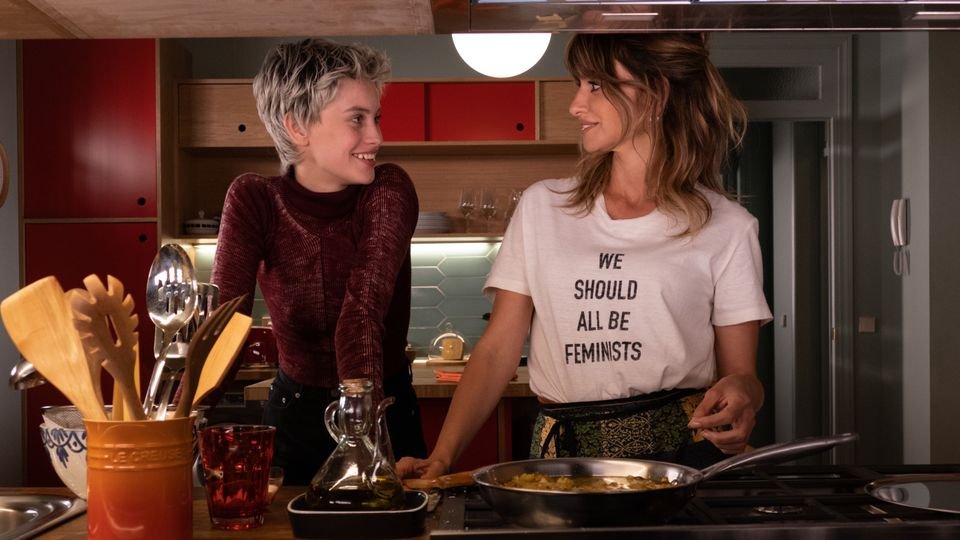
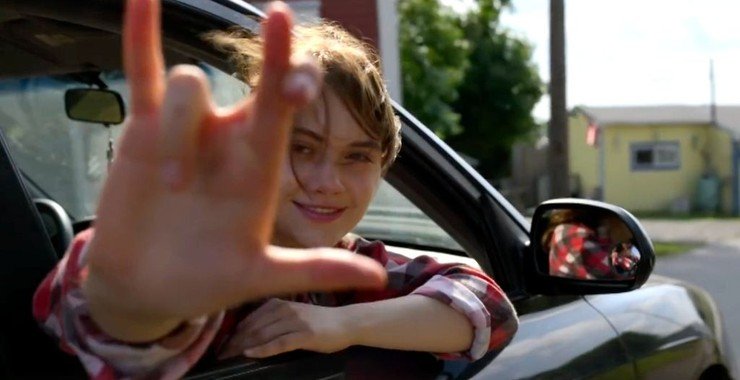

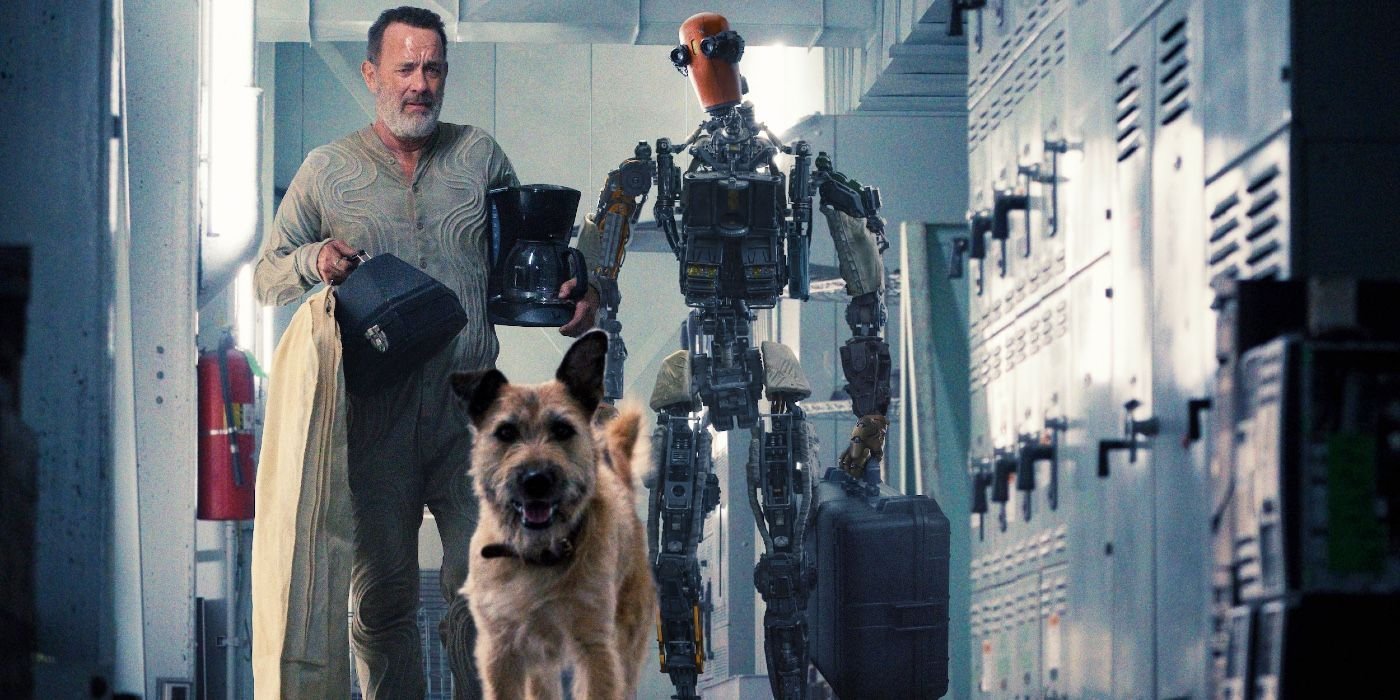



 11. Nomadland A-
11. Nomadland A-
 10. French Exit B+
10. French Exit B+
 9. Mass A-
9. Mass A-
 8. Judas and the Black Messiah A
8. Judas and the Black Messiah A
 7. The Power of the Dog A
7. The Power of the Dog A
 6. C'mon C'mon A
6. C'mon C'mon A
 5. Collective A
5. Collective A
 4. Quo Vadis, Aida? A
4. Quo Vadis, Aida? A
 3. Minari A
3. Minari A
 2. Passing A
2. Passing A
 1. Spencer A
1. Spencer A
 5. Dear Evan Hansen C+
5. Dear Evan Hansen C+
 4. Reminiscence C+
4. Reminiscence C+
 3. Titane C
3. Titane C
 2. Malcom & Marie C
2. Malcom & Marie C
 1. New Order C
1. New Order C